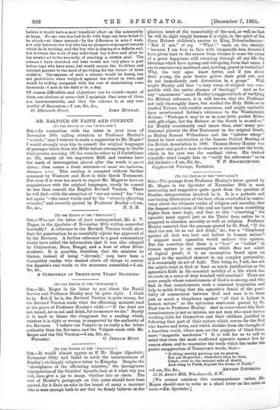[TO THE EDITOR or THE "SrEcTsTon."3 Stn, — It would almost appear
as if Mr. Magee (Spectator, November 30th) had failed to catch the inne.rmostness of Huxley's strikingly religious letter to Kingsley. Despite the "slovenliness of the officiating minister," the incongruous interpolation of the Gentiles' Apostle, look at it what way you will, does give a jar to many, whether lath or cleric. The rest of Huxley's paragraph on this point should have been quoted, for it Ands an echo in the breast of many mourner who is man eneugh betla to Rev that he farnaly believe!' in the glorious tenet of the immortality of the soul, as well as that he 'will do right simply because it is right, in the spirit of the three Hebrew children' e answer to King Nebuchadnezzar: "But if not," et seq. "What !" reads on the excerpt, "because I am face to face with irreparable loss, because have given back to the source from whence it came the cause of a great happiness, still retaining through all my life the blessings which have sprung and will spring from that cause, I am to renounce my manhood, and, howling, grovel in bestiality? Why, the very apes know better, and if you shoot their young, the poor brutes grieve their grief out, and do not immediately seek distraction in a gorge." Well might Huxley add that "a deep sense of religion was com- patible with the entire absence of theology." And as for any " Mnazement " anent Huxley's suggested lack of verifying his Biblical reference, it is well known that the Professor not only thoroughly 'blew, but studied the Holy Bible as he studied Nature, with erudite exactness, and might equitably have reverberated Selden's utterance to the Westminster divines: "Perhaps it may be so in your little pocket Biblea with gilt edges, but the Hebrew or the Greek is so-and-so," for HuXley consistently read (more than, alas! many' pro- fessional priests) the New Testament in the original Greek, as Bishop Samuel Wilberforce and the "inferior -clergy" found in their calcitration at the famous Oxford Meeting of the British Association in 1860. Thomas Henry Huxley was too great and good a man to obscure or circumvent the truth, which in his eyes was the cardinal virtue. His trained scientific mind taught him to "verify his references" as he tlid his faets.—I am, Sir, &c., T. P. BROCKLERVEST. Giggleswick Vicarage, Yorkshire,






























































 Previous page
Previous page